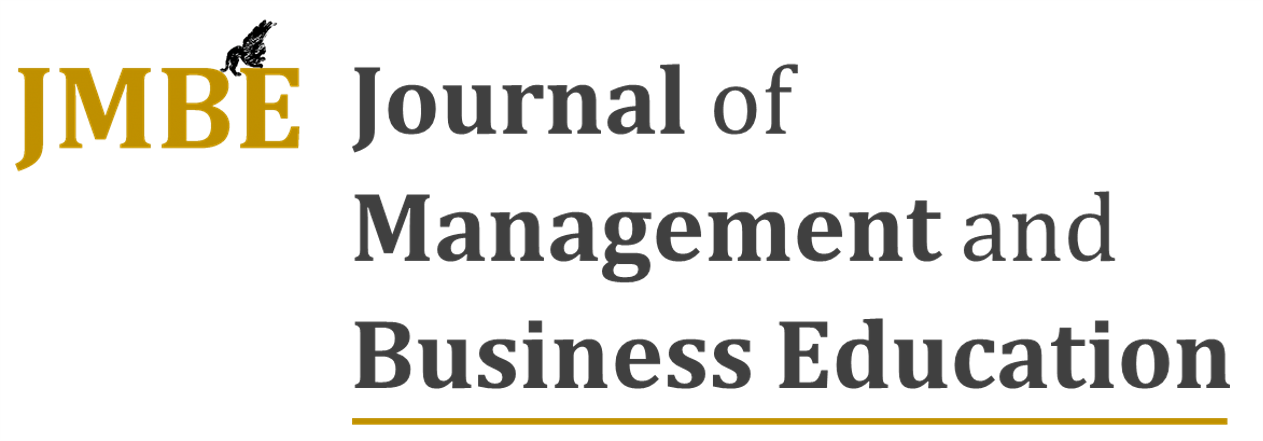Reinforcing the involvement of students in learning business economics through active methodologies and student response systems
DOI:
https://doi.org/10.35564/jmbe.2020.0004Keywords:
teaching, active methodology, inverted classroom, perception, higher educationAbstract
This work gathers an experience carried out during the academic years 2018-2019 and 2019-2020 in the Degree in Business Administration and Management in the Faculty of Economics and Business of the University of the Basque Country/Euskal Herriko Unibertsitatea (Gipuzkoa section). The main objective of the essay is to reinforce the involvement of students in the learning process and, secondly, to collect their perception of active methodologies for teaching-learning and thus be able to improve their application. To this end, we have used resources that employ the students' mobile phones, specifically the Socrative tool, to respond to online questionnaires, with the aim of reinforcing the motivation and participation of the students, and in the general context of the inverted classroom methodology.
Downloads
References
Altaany, F.H. & Alsoudani, K.A. (2015). Impact of using Socrative for student in Irbid National University. Proceedings of the 3rd Global Summit on Education GSE.
Awedh, M., Mueen, A., Zafar, B. & Manzoor, U. (2014). Using Socrative and smartphones for the support of collaborative learning. International Journal on Integrating Technology in Education (IJITE), 3(4), 17-24.
https://doi.org/10.5121/ijite.2014.3402
Bloom, B.S. (1968). Learning for Mastery. Evaluation Comment (UCLA Center for the Study of Evaluation of Instructional Programs), 1 (2), 1-12.
CRUE (2006). Propuestas metodológicas para la renovación de las metodologías educativas. Madrid, MEC.
Dakka, S.M. (2015). Using Socrative to enhance in class student engagement and collaboration. International Journal on Integrating Technology in Education, 4(3), 13-19.
https://doi.org/10.5121/ijite.2015.4302
Dervan, P. (2014). Enhancing in-class student engagement using Socrative (an Online Student Response System): A report. All Ireland Journal of Teaching and Learning in Higher Education, 6(3), 1801-1813.
Fadini, K. and Finardi, K. R. (2015). Affordances of web 2.0 interfaces for the teaching/learning of L2 in the flipped classroom. International Conference of Education, Research and Innovation, 2015, Sevilha, 1, 1052-1058.
Fernández, M.; Godoy Guglielmone, M.V.; Mariño, S.I. & Barrios, W. (2017). ¿Invirtiendo la clase o invirtiendo en la clase? Enseñanza de tecnología para la producción multimedia mediante Aula invertida. XXIII Congreso Argentino de Ciencias de la Computación, Buenos Aires.
https://doi.org/10.2307/j.ctv346qfz.4
Fernández March, A. (2006). Metodologías activas para la formación de competencias. Educatio Siglo XXI, 24, 35-56.
Flipped Learning Network (2014). What is flipped learning? Consultado en octubre de 2019 en: https://flippedlearning.org
Flipped Learning Network (2019). FLIP Learning (página web). Consultado en octubre de 2019 en: https://flippedlearning.org/definition-of-flipped-learning/
Fortanet van Assendelft de Coningh, C.A.; González Díaz, C.; Mira Pastor, E. & López Ramón, J.A. (2013). Aprendizaje cooperativo y flipped classroom. Ensayos y resultados de la metodología docente. En Tortosa, M.T.; Álvarez, J.D. & Pellín, N. (coords.). Retos de futuro en la enseñanza superior: Docencia e investigación para alcanzar la excelencia académica. Universidad de Alicante, España.
https://doi.org/10.19083/ridu.2.27
Galway, L.P.; Corbett, K.K.; Takaro, T.K.; Tairyan, K. & Frank, E. (2014). A novel integration of online and flipped classroom instructional models in public health higher education. Bmc Medical Education, 14(181).
https://doi.org/10.1186/1472-6920-14-181
García-Estupiñán, S.B., Castro, N.C. & Mera, F. (2019).Aplicación del Flipped Classroom en la Carrera de Economía Agrícola: Una experiencia práctica. Revista científica Ciencia Tecnología, 19 (21), 75-88.
Hernández Nanclares, N. & Pérez Rodríguez, M. (2015). Students’ satisfaction with a blend instructional design: the potential of “Flipped Classroom” in Higher Education. Journal of Interactive Media in Education, 1(4), 1-12.
https://doi.org/10.5334/jime.397
Kaya, A. & Balta, N. (2016). Taking Advantage of Technologies: Using the Socrative in English Language Teaching Classes. International Journal of Social Sciences & Educational Studies, 2(3), 4-12.
Kong, S.C. (2014). Developing information literacy and critical thinking skills through domain knowledge learning in digital classrooms: An experience of practicing flipped classroom strategy. Computers & Education, 78, 160-173.
https://doi.org/10.1016/j.compedu.2014.05.009
López García, J.C. (diciembre de 2019). La taxonomía de Bloom y sus actualizaciones. Eduteka. Consultado en diciembre de 2019 en http://eduteka.icesi.edu.co/pdfdir/TaxonomiaBloomCuadro.pdf
Marqués, M. (2016). Qué hay detrás de la clase al revés (flipped classroom). Actas de las XXII JENUI. Almería, Universidad de Almería.
Marqués, M. & Badía, J.M. (2014). Una experiencia de enseñanza centrada en el aprendizaje. Actas del Simposio/Taller XX Jenui, 37-44.
Méndez Coca, D. & Slisko, J. (2013). Software Socrative and smartphones as tools for implementation of basic processes of active physics learning in classroom: an initial feasibility study with prospective teachers. European Journal of Physics Education, 3(2), 17-24.
Novak, G., Gavrin, A., Christian, W. & Patterson, E. (1999). Just in time teaching: blending active learning with web technology. Pearson, London.
Platero, M., Tejeiro, M.R. & Reis, F. (2015). La aplicación de Flipped Classroom en el curso de Dirección Estratégica. XII Jornadas Internacionales de Innovavión Universitaria, 119-133.
Sánchez Rodríguez, J.; Ruiz Palmero, J. & Sánchez Vega, E. (2017). Flipped classroom. Claves para su puesta en práctica. Edmetic. Revista de Educación Mediática y TIC, 6(2), 336-358.
https://doi.org/10.21071/edmetic.v6i2.5832
Sein-Echaluce Lacleta, M.L.; Fidalgo Blanco, A. & García Peñalvo, F. (2015). Metodología de enseñanza inversa apoyada en b-learning y gestión del conocimiento. III Congreso Internacional sobre Aprendizaje, Innovación y Competitividad.
https://doi.org/10.26754/cinaic.2017.000001_069
UPV/EHU (2019a). Bases para el desarrollo curricular de las titulaciones oficiales de la UPV/EHU. Consultado en octubre de 2019 en: https://www.ehu.eus/es/web/sae-helaz/ikd-curriculum-garapena-oinarriak
https://doi.org/10.4185/rlcs-2015-1067
UPV/EHU (2019b). Estrategia IKD i3. Consultado en diciembre de 2019 en: https://www.ehu.eus/es/web/iraunkortasuna/ehuagenda-2030/ikd-i3-estrategia
Wash, P. (2014). Taking advantage of mobile devices: using Socrative in the classroom. Journal of Teaching and Learning with Technology, 3(1), 99-101.
Downloads
Published
How to Cite
Issue
Section
License
Copyright (c) 2023 Journal of Management and Business Education

This work is licensed under a Creative Commons Attribution-NonCommercial-ShareAlike 4.0 International License.
License terms at: https://creativecommons.org/licenses/by-nc/4.0/legalcode




